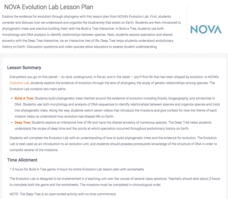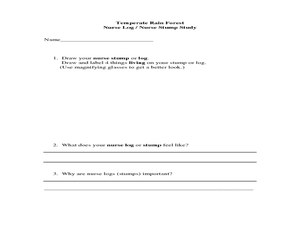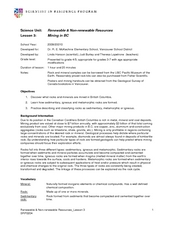Teach Engineering
Introduction to Environmental Engineering
A series on environmental engineering introduces the class to issues that environmental engineers work to solve. This first lesson focuses on air and land issues, and looks at ways to reduce pollution.
National Wildlife Federation
Quantifying Land Changes Over Time in Areas of Deforestation and Urbanization
Is qualitative or quantitative research more convincing when it comes to climate change? In the eighth lesson during this 21-part series, scholars begin by performing a quantitative analysis of deforestation and urbanization. Then, they...
National Wildlife Federation
What is DBH?
When measuring the circumference of a tree, does it matter how high you place the measuring tape? Most scholars have never considered this question, but scientists know that measurement techniques must be standardized. The 13th...
National Wildlife Federation
When It Rains It Pours More Drought and More Heavy Rainfall
Which is worse — drought or flooding? Neither is helpful to the environment, and both are increasing due to climate change. The 16th lesson in a series of 21 covers the average precipitation trends for two different climates within the...
National Wildlife Federation
I’ve Got the POWER! Solar Energy Potential at Your School
Should every school have solar panels? The 19th lesson in a series of 21 has scholars research the feasibility of using solar panels at their school. They begin by gathering data on the solar energy in the area before estimating the...
National Wildlife Federation
I Speak for the Polar Bears!
Climate change and weather extremes impact every species, but this lesson focuses on how these changes effect polar bears. After learning about the animal, scholars create maps of snow-ice coverage and examine the yearly variability and...
National Wildlife Federation
The Tide is High, but I’m Holding On… Using ICESat Data to Investigate Sea Level Rise
Based on the rate of melting observed from 2003-2007 in Greenland, it would take less than 10 minutes to fill the Dallas Cowboys' Stadium. The 17th lesson in a series of 21 has scholars use the ICESat data to understand the ice mass...
PBS
NOVA Evolution Lab Lesson Plan
It doesn't matter if you look on land, in the air, underground, or in water—evolution is everywhere. Scholars complete worksheets with multiple question types as they progress through six online missions creating phylogenic trees.
K-State Research and Extensions
Size It Up
The three types of rock aren't classic, punk, and hard. The chapter covers everything scholars need to know about rocks. Pupils compare rocks, learn about their formation, see how rocks change, and follow every step of the rock cycle....
NASA
Biology Training Conclusion
Gravity is just one consideration when determining human habitability on a new planet. The lesson connects four different units and starts with connecting the various systems: planetary systems, human body systems, etc. After scholars...
Curated OER
Turn Off the TV
In this vocabulary usage online/interactive worksheet, students fill in the blanks in sentences with vocabulary words from the word bank. Students fill in 10 blanks.
Curated OER
Designing a Germination Experiment
Students explore botany by participating in a seed experiment. In this plant nutrition instructional activity, students define several science experiment vocabulary terms like observation, treatment, and replicate. Students utilize...
Curated OER
The Effects of Storms
An excellent way to review a chapter or unit on storms, this worksheet features vocabulary review (gust, evacuation, storm surge, salinity), concept review (effects and details about hurricanes), skills/process review (normal high tide...
Curated OER
Oh, Let the Rain Fall Down
Fifth graders explain the three phases of the water cycle in a narraive paragraph where they describe the journey of a single raindrop. They are introduced to five science vocabulary words and personfication.
Curated OER
Fun With Food Chains
Students explore our ecosystem by researching animal eating habits. For this food chain lesson, students identify the links between predator and prey and the energy that passes between organisms based on what their diet consists of....
Curated OER
Temperate Forest : Pacific Spirit Field Trip
Students examine nurse logs with hand lenses and identify animals. In this ecosystem lesson, students gain understanding of the rainforest by studying nurse logs. Students become familiar with vocabulary through their study of nurse logs.
Curated OER
Forest Food Chains and Webs
Students explore forest ecological systems. In this ecology lesson, students classify forest plants and animals according to their ecological roles. Students play a related vocabulary guessing game. Students choose a card on which a...
Curated OER
The Nervous System
Students investigate the nervous system. In this anatomy instructional activity, students identify and define vocabulary related to the nervous system. Students role play the parts of a nervous system and perform an experiment measuring...
Curated OER
Biomes of the World (and Canada)
Learners explore environments by analyzing food chains. In this biome identification instructional activity, students define a list of environmental vocabulary terms such as tundra, rain-forest and desert. Learners create a fictional...
Curated OER
Renewable and Non-Renewable Resources: Mining in B.C.
Students explore energy by categorizing rocks. In this British Columbia geology lesson, students define many different vocabulary terms associated with mining such as sedimentary, igneous, and metamorphic. Students utilize sample rock...
Curated OER
Biotic and Abiotic Factors
In this biotic and abiotic factors worksheet, students complete 20 various types of questions related to biotic and abiotic factors. First, they write the vocabulary word that best completes the sentence. Then, students state an example...
Curated OER
Photosynthesis
For this photosynthesis worksheet, students complete 20 various types of questions related to photosynthesis. First, they match each description in the first column with the correct vocabulary term in the second. Then, students explain...
Curated OER
Changes in Ecosystems
In this changes in ecosystems worksheet, learners complete 21 various types of questions related to ecosystem. First, they determine whether each statement is true or false based on vocabulary. Then, students determine whether natural...
Curated OER
Designing a Germination Experiment - Part 1
Students experiment with seeds and germination. In this natural science lesson, students discuss the stages of germination. Students engage in a 4 part hands on science activity to view the process of germination.
Other popular searches
- Space Science Vocabulary
- Earth Science Vocabulary
- Food Science Vocabulary
- Science Vocabulary Games
- Vocabulary Forensic Science
- Physical Science Vocabulary
- Life Science Vocabulary
- Science Vocabulary Portfolio
- Vocabulary Exercises Science
- Science Vocabulary Puzzle
- Science Vocabulary Lesson
- Science Vocabulary Polymers

























